Rooted Cosmopolitans: From the Sassoons to Sun Yat-Sen
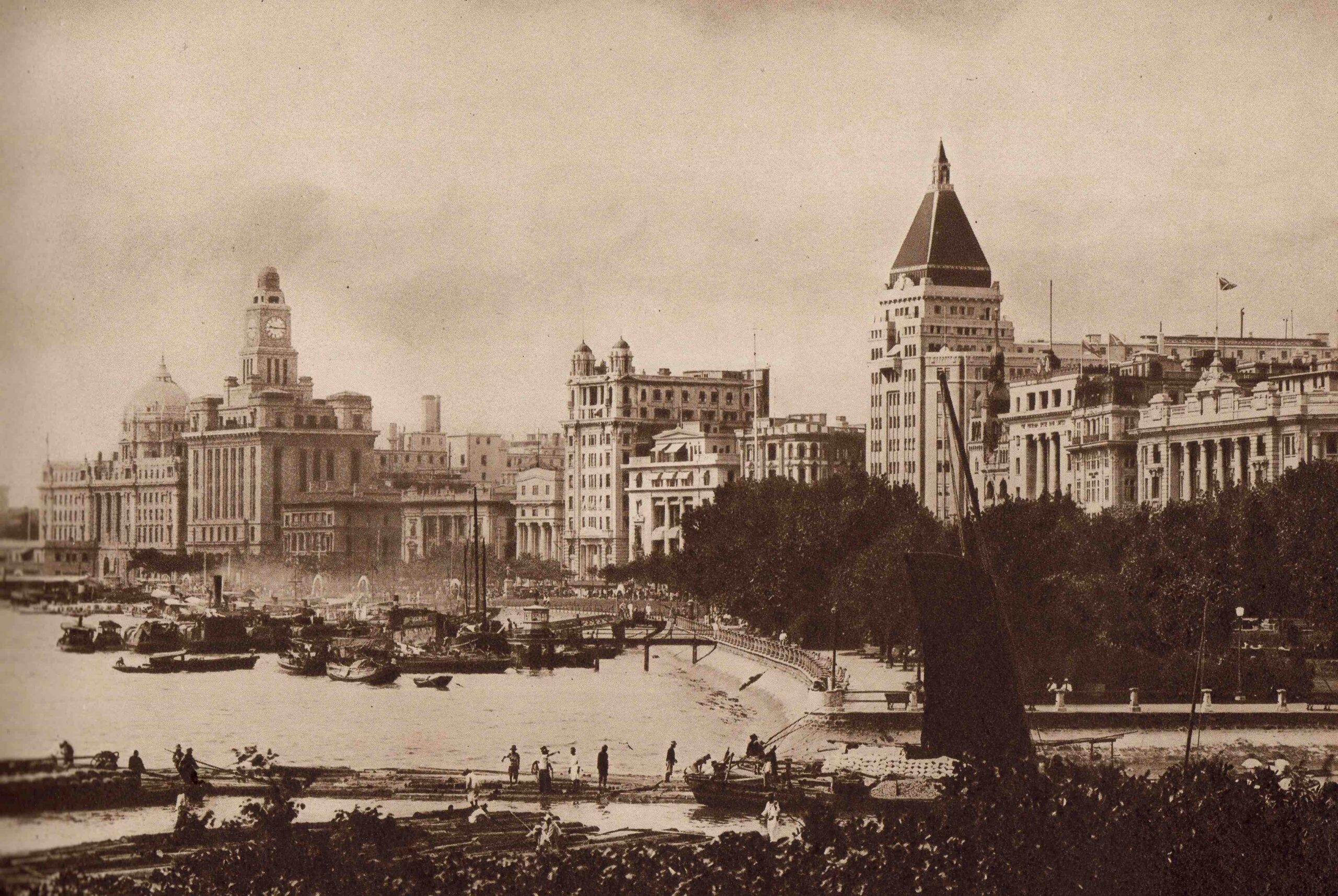
In Memory of Dr. Zvi Yehuda, A”H, who served as Academic Council Chairman and former Head of the Babylonian Jewry Heritage Center’s Research Institute at Or Yehuda, Israel. Dr. Yehuda was “the last of the ‘old guard’”—Mordechai Ben-Porat, Shlomo Hillel, Professor Shmuel Moreh—“associated with the Center….”
Click here to dedicate a future issue in honor or memory of a loved one

The American Sephardi Federation’s Sephardi Ideas Monthly is a continuing series of essays and interviews from the rich, multi-dimensional world of Sephardi thought and culture that is delivered to your inbox every month.
Last month, SIM inaugurated a new series exploring 19th and 20th c. Jewish life in South and East Asia by featuring Dawei Wang’s excellent essay, “From Zionism to Self-Rule: Singapore’s Baghdadi Jews.” This month we’re moving into the 21st c. and viewing Jewish life in Asia from multiple perspectives, both in time and space, by following the path that led Wang, a Chinese freelance-journalist based in London who received his MPhil in Modern Middle Eastern Studies from the University of Oxford, to take a deep dive into south and east Asian Baghdadi Jewish life. Wang’s own perspective and experience richly resonate with the Baghdadi Jews to whom he devoted such serious study, and as he explains in the interview, he relates to the “rooted cosmopolitanism” of the Baghdadi Jews as a personal model. Along the path of our discussion, Wang takes us to Istanbul during the anti-Erdogan coup, points to the manner in which Zionism inspired Chinese leaders and intellectuals at the beginning of the 20th c., argues for “a more holistic perspective in our evaluation of colonialism,” and by holistically considering the opium question, concludes that the future stability of globalization, and the exchange of ideas that makes globalization so worthwhile, requires an ethical dimension.
Next month’s issue of Sephardi Ideas Monthly will extend our series by zooming into the dynamic city-state of Singapore, one of the most important centers of 21st c. global commerce, and featuring an interview with Mr. Nash Benjamin, President of the Jewish Welfare Board of Singapore and Chairman of FJ Benjamin Holdings, Ltd. Benjamin is a descendant of an old Baghdadi Jewish family; both Wang and Benjamin make clear, from different perspectives, the deep impression that Baghdadi Jewish life in Asia has left on living and imagined communities.
Sephardi Ideas Monthly: Thank you, Dawei Wang, for taking the time to be with us. Last month, Sephardi Ideas Monthly featured a revised chapter from your excellent Oxford Master’s thesis on the Baghdadi Jews of East Asia, “From Zionism to Self-Rule: Singapore’s Baghdadi Jews.” We should step back, however, and note that you were born and raised, at least through High School, in China, and it’s natural to wonder what moved you to investigate and study Baghdadi Jewry. Please trace for us the main stations on the physical and cultural journey that you followed from China to the study of East Asian Baghdadi Jewry at Oxford. Perhaps you can begin with a few words about your background. Where were you born, and what was your home like in China? Then, how did you end up spending your High School and College years in the United States and later find yourself studying in Turkey during a failed military coup?
Dawei Wang: First of all, thank you very much for publishing my essay and for inviting me to be part of Sephardi Ideas Monthly. I spent my childhood in Wuhan, a renowned city that some of your readers may be familiar with. I was fortunate to be born into an intellectual family. My father studied western art in college and was the head of a landscape architecture firm for most of his career. Meanwhile, my mother taught English at a local high school. Both of them are perpetual learners, particularly my father, who is also a published writer in Chinese classics.
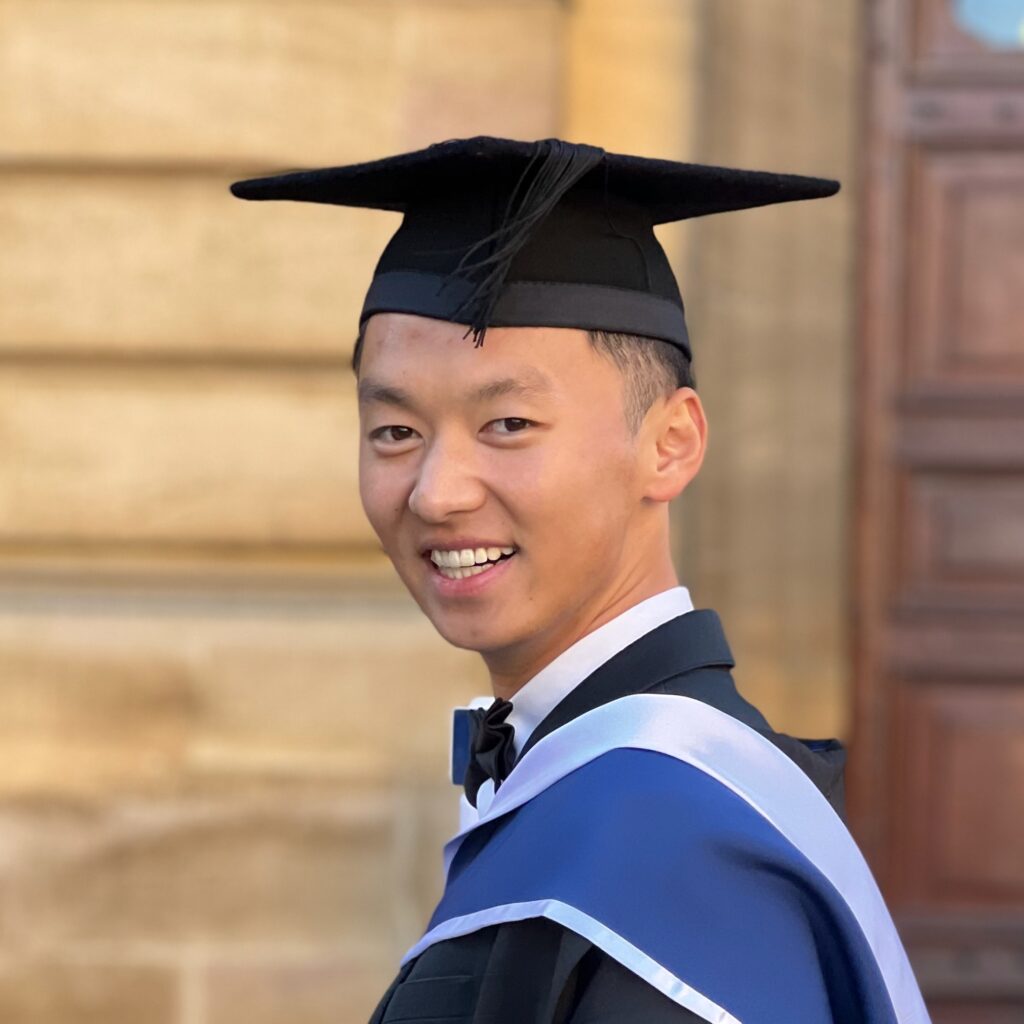
Growing up, I was heavily influenced by my father and developed a broad intellectual interest in global history and both Western and Chinese classics. I aspired to be a person of the world, but Wuhan was—and still is—a provincial city, unlike the cosmopolitan hubs of Shanghai, Beijing, and Hong Kong. My father also feared that a conventional Chinese high school education, which emphasizes rote memorization and exam scores, would stifle my curiosity. Therefore, he decided that I should attend a boarding school in the United States, where I could explore my intellectual interests freely. So I studied world history and western classics at Northwestern University after spending three years at a prep school in Alabama.
During freshman year of college, I took a class in Byzantine Art, where I learned a lot about the architecture of Constantinople. I was mesmerized by the beauty and ingenuity of the Byzantines, to the extent that I decided to attend a summer school at a university in Istanbul.
SIM: Istanbul/Constantinople is a cosmopolitan city with a rich history in a country with deep political divisions along the edge of the turbulent Middle East. How did your time in Istanbul impact your interests and subsequent course of study?
DW: The summer of 2016 in Istanbul had a profound impact on me. While I was there, the Turkish military staged a coup to overthrow President Erdogan. I remember going out on the streets in the evening, against the warning of the university, and seeing the presidents’ supporters marching towards the tanks, while F-16 fighter jets sliced through the sky above us in ultra-low attitude.
As a Chinese kid who had never ventured beyond the cocoons of East Asia and America, the experience felt very surreal and exhilarating. I thought to myself: “The Middle East is such a fascinating and dynamic region. This kind of stuff will never happen where I come from!”
So upon returning to the United States, I decided to study the Middle East in conjunction with my classical studies. I studied Arabic while on a semester exchange at Northwestern’s Qatar campus. In my final years of college, I attended academic programs in Oman, Jordan, and Israel, where I spent two weeks at the Hebrew University. I enjoyed the region so much that I applied for graduate studies in Middle Eastern history in 2019 and was accepted to both Harvard and Oxford. I eventually chose the latter and earned an MPhil in Modern Middle Eastern Studies in 2021.
How did I choose my thesis topic? While strolling along the Bund in Shanghai the summer before my departure to Oxford, I wandered into the lobby of a prominent historic building at the riverfront, the Fairmont Peace Hotel. To my surprise, I discovered that it was constructed in the late 1920s by a Baghdadi Jewish businessman named Victor Sassoon.
This discovery sparked my curiosity in the transnational network of Baghdadi Jewish merchants in colonial Asia, which eventually became the subject of my dissertation. Surprisingly, the more I researched, the more I realized that I shared many similarities with my research subjects.
SIM: That’s fascinating. Please say more about this. In what way did you, a young Chinese man who grew up in China, lived for many years in the U.S. and was pursuing his MA at Oxford, identify with the Baghdadi Jews of East Asia?
DW: Both the Baghdadi Jews and I are beneficiaries of globalization. The Sassoons and other Baghdadi Jewish families came from the Middle East and found their way to China. I, on the other hand, have my roots in China and ventured to the Middle East. As I flipped through the pages of Israel’s Messenger − a prominent Baghdadi Zionist newspaper in Shanghai during the colonial era − I realized that members of the Baghdadi Jewish diaspora were remarkably erudite, cosmopolitan, and intellectually curious. They were the global citizens of their days. This is why I have enormous interest in and respect for this historic community.
SIM: So both you and the Baghdadi Jews were beneficiaries of globalization. Your cross-cultural, open perspective goes against the grain of post-colonial studies. It’s also very interesting. You seem to be implying that, in evaluating colonial history, any broad and deep reading of history requires that we consider the positive contributions of colonial powers to economic and cultural development.
DW: Certainly. Examining colonial history through the prism of the Baghdadi Jews is crucial for our understanding of colonialism and globalization. The conventional historiography on British colonialism, which emerged during the anti-colonial struggle and has been adopted by contemporary academia, focuses on the negative aspects of British rule. For many, the issue is one of good versus evil, with globalization under British colonialism representing the latter.
While such criticisms hold much truth, it’s essential to remember that colonialism, like any historical phenomenon, is not black and white. Rather than hastily forming moral judgments, we can adopt a more holistic perspective in our evaluation of colonialism and examine both the positive and negative aspects of the colonial experience.
For instance, the Baghdadi Jews benefited from British protection of minorities. While their Iraqi brethren were persecuted in waves of pogroms and gradually stripped of their citizenship rights under the pro-Nazi government, the Baghdadi Jews in Shanghai and Singapore – both under British rule or influence – thrived in a safe environment devoid of antisemitic violence and were free to conduct their businesses and engage in Zionist activities. Similar protection was extended to other minorities under British rule, such as the ethnic Chinese in Malaya.
Furthermore, the protection extended not only to minorities but also to revolutionaries and fugitives escaping from those in power. Dr. Sun Yat-Sen, the founding father of modern China, used Singapore and Hong Kong as conduits to raise funds from the Chinese diaspora, who financed the 1911 Republican Revolution that overthrew the Qing dynasty. Founding members of the fledgling Chinese Communist Party, including Mao Zedong and Zhou Enlai, resided in Shanghai’s French Concession for many years, which provided them much-needed protection from Chiang Kai-Shek’s secret police. In both instances, these leaders’ immediate goals – though disruptive to the existing local order – did not directly endanger colonial rule, allowing them to conduct their political activities without interference. Yes, of course, the treatment was very different for those who dared to challenge colonial rule in action.
British rule also created an interconnected world, which facilitated the transnational exchange of ideas. It’s no coincidence that Shanghai’s two foreign concessions housed the most vibrant newspaper publishing scene in Asia. Israel’s Messenger in Shanghai, funded and edited by Baghdadi Zionist businessman N.E.B. Ezra, was the most widely circulated Jewish periodical east of Suez, with subscriptions sold in Baghdad, Bombay, Rangoon, Singapore, and Shanghai. Members of the community residing in various cities used the newspaper’s social columns as a bulletin and its opinions section as a platform to debate topics of significance to the world’s Jewish community.
Chinese-language media also had a similar dynamism. Over 90% of modern China’s newspapers and publishing houses were located in Shanghai’s foreign concessions, where leading intellectuals from across the Chinese-speaking world gathered to discuss new ideas and global phenomena. In addition to Baghdadi Jewish and Chinese media, numerous other publications in English, Japanese, German, Russian, and dozens of other languages were found in Shanghai during the same period, catering to the multilingual residents of the city. Looking back, “Jazz-Age Shanghai” really was quite a remarkable scene.
These examples aren’t meant to suggest that colonial rule is preferable or necessary to achieve these goals. Rather, they demonstrate that the colonial experience varied significantly across different locales and communities. While we are free to form our moral judgment on the subject, we should keep in mind that the reality is often more complex than a simplistic black-and-white view.
SIM: You, a young man from a Chinese family who grew up in China and lived and studied in the United States, Europe and the Middle East, personally identify with the Baghdadi Jews of Asia as beneficiaries of globalization. In your opinion, does China as a whole have anything to learn from the Baghdadi Jews of Shanghai?
DW: The contributions of the Jewish people and the idea of Zionism to the growth of Chinese nationalism during its formative stage are often overlooked. Chinese elites of this period, especially those who were educated abroad, looked to Zionism and its successes as a source of inspiration.
Dr. Sun Yat-Sen, in a letter to N.E.B. Ezra, the Baghdadi Jewish editor of Israel’s Messenger, affirmed China’s support of the Balfour Declaration and expressed his sincere admiration for the Jewish people.
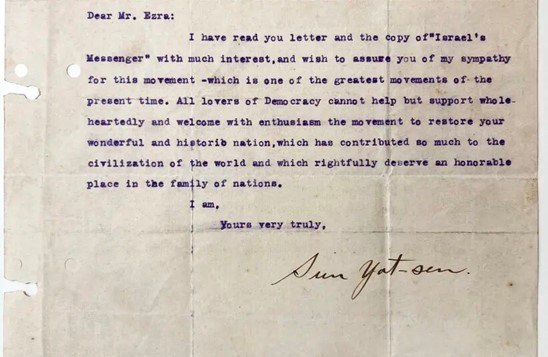
(Photo Courtesy of Dawei Wang)
Like many other Chinese elites, Sun saw Zionism as a model and source of inspiration for promoting his own brand of nationalism, which was spurred by China’s vulnerability to Western and Japanese imperial expansion. Their favorable view of Zionism could also be attributed to a general appreciation of the “Jewish race” in the Chinese intellectual circles. Hu Shi, one of modern China’s most celebrated writers, regarded the Jews as “a superior and intellectual race” with “intrepid and upward spirit” worthy of Chinese emulation. Hu’s contemporary, Yu Songhua, saw the Jewish people as “a model for the restoration of the ‘Chinese race.’”
After Sun died, N.E.B Ezra and the president of the Shanghai Zionist Association received official invitations from the Chinese government to attend Sun’s funeral in Nanjing. They were the only foreign guests in attendance who did not represent a sovereign state. The Zionist flag was also set alongside other national flags in front of the Shanghai Rotary Club.
SIM: These connections are fascinating and deserve deeper exploration. But there’s an issue that we have to address: how does the opium trade fit into this picture? After all, the Sassoon family made a significant part of their fortune in the opium trade.
DW: You’re right. The opium trade is a complex issue that requires a nuanced understanding of the historical context. While it is true that the Sassoons, along with most of the Baghdadi Jews in Asia, participated in the opium trade, it is also important to note that they were not the only ones involved.
Many different groups engaged in the sale of opium during the colonial period, including Indian farmers who cultivated the drug, British firms such as Jardine and Swire who competed with the Sassoons as middlemen, and local Chinese merchants and officials who collaborated with foreigners to facilitate its distribution. As with any multinational enterprise that depends on globalization and free trade, the opium industry had numerous participants, and the Baghdadi Jews were just one among many.
Rather than singling out the opium trade as an exceptional phenomenon, we should view it as a tragic consequence of globalization, just as we view the environmental degradation in developing countries caused by the rapid expansion of multinational corporations. Both are the outcomes of individuals and institutions prioritizing profit over basic ethical principles in a globalized market.
I do not believe that the free sale of opium was inherently problematic. It was even legal in the United Kingdom for most of the 19th century and could be purchased at pharmacies. However, the forced importation of opium at gunpoint, such as occurred during the two Opium Wars, violated the basic human principle of mutual respect. It does not constitute an irredeemable “sin” but rather a misuse of the enormous power and freedom that globalization produces. The Sassoon family, for instance, relied on their connections in the British government to lobby against proposed anti-opium legislations, and they were successful in prolonging the opium trade for another 20 years after British public opinion had shifted against it.
It is precisely this type of misuse of power that fueled the anti-colonial movements, which ultimately led to the dissolution of the British Empire and the globalization it championed. The fall of the Sassoon family, whose fate was intimately tied to globalization, was a consequence of this process.
As we confront the challenges of our contemporary world, where resistance to globalization is growing ever stronger, it’s essential to keep in mind the lessons of the Sassoon family and the British Empire.
SIM: Please explain what you mean by a more ethical globalization; what are we talking about, in practice? And how, in your opinion, does China fit into this picture?
DW: To make globalization more ethical, those who benefit from the current world order should learn that “unrestrained” globalization − that is, pursuing profits without the basic moral constraints − is detrimental to their own prosperity and survival. They also need to be rooted in the society in which they live and maintain an intimate knowledge of and empathy for the ordinary people around them.
Another crucial aspect of a more ethical globalization is to provide more people with access to and benefits from the globalized market, giving them a stake in maintaining the system. As we have seen from the British colonial experience, beneficiaries such as the Sassoons were the lucky few. For ordinary people in the colonies, they did not enjoy the fruits of the rapid economic growth and were frequently exploited and discriminated against based on their race. These grievances were widespread and eventually led to the dissolution of the global order.
Despite the negative effects of globalization, it also provides significant benefits. In addition to material prosperity, globalization enables the free exchange of ideas. For instance, the dialogue between Zionist and Chinese leaders in Shanghai contributed to the development of Chinese nationalism, while the tolerant and supportive attitude of the Chinese facilitated the Zionist fundraising effort in the East.
As modern Chinese citizens, most of us are beneficiaries of globalization, both materially and intellectually. If we want to stay engaged in a globalized world, we should recognize that the free exchange of goods and services goes hand-in-hand with the free exchange of ideas. It would be extremely difficult and costly to control one without releasing the other. And why should we? After all, modern China is the product of globalization. If we want to keep it, we must fully embrace the interconnected world.
The Baghdadi Jews provide a model of participation in a globalized world. They cherished their traditions and actively engaged in critical matters related to the Jewish people while being active on a central stage of a cosmopolitan world. They were what we might call “rooted cosmopolitans,” rooted in their Jewish identity but cosmopolitan participants in globalization. I hope that more of us will learn from their lessons and experiences and use them as inspiration to chart our paths forward in a globalized world.
~~~~~~~
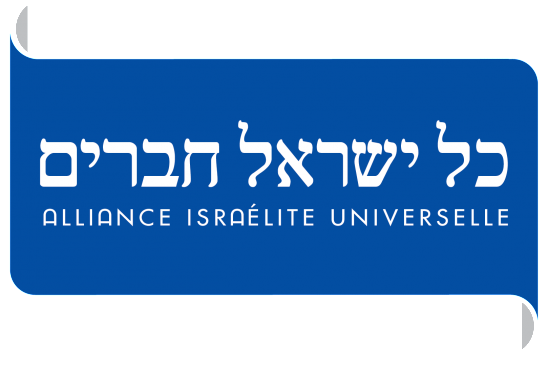
The Monthly Sage החכם החודשי
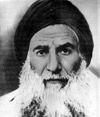
(Photo courtesy of HeHaCham HaYomi)
The sage for the month of January is Hakham Yosef Buchris (1885-1949).
Born in Djerba, Tunisia, young Yosef studied with Hakham David Hacohen Gadisha, but financial pressures forced Yosef to stop his studies in order to help support the family. However, when Hakham Ma’atuk Atudji Hacohen learned about the situation, he arranged for the family to receive support from wealthy townspeople, and Yosef was able to resume his studies, this time with the Rabbi of Djerba, Hakham Moshe Zaqen Mazouz.
In 1915, Hakham Yosef Buchris was chosen to serve as judge in the Hara Ze’ira Jewish quarter, and in 1921 he was chosen to lead the community in Zarzis, a position that he retained for the rest of life. Loved by the community, Hakham Yosef’s main preoccupation was learning Torah and performing deeds of lovingkindness, as he took care of the needy and was known for his charitable and compassionate deeds. For instance, he would go from door to door collecting food for the poor, and then carry the food himself to the homes of the needy. What’s more, when asked by the community to submit the names of those receiving donations, Hakham Yosef refused, not wishing to embarrass anyone.
Hakham Yosef Buchris authored several works that were published after his death, including Yosef Lekakh—two volumes of original commentary on the Torah and a collection of sermons; Zichron Yosef—original commentary and legal responsa; and Zechut Yosef – sermons.
Hakham Yosef Buchris passed away on 5 Adar 5709 (1949) at the age of 64. Thirty years later, his remains were brought to Israel and buried on the Mount of Olives.
In this section from his Torah commentary, Hakham Yosef teaches that at the time of redemption, even those who have lost their religion will be gathered in, as long as a Jewish heart beats within:
‘And it shall come to pass on that day, a great ram’s horn shall be sounded.’ Just like a king who has long been at battle and wishes to return home, who assembles all his troops in one place to see who is missing, sounds a horn for all to assemble, and then returns home. So will it be in the redemption of the future; He will first assemble us all in the desert, to see who is missing, and then the ram’s horn will be sounded for all to assemble. Even the Jews who have ‘strayed in the land of Assyria’ and those who have lost their religion and are ‘in the land of Egypt’ such as the anussim [Crypto-Jews] of Spain, Rome, and the like – all those within whom beats a Jewish heart.
~~~~~~~

From Generation to Generation: a Legacy of Faith and Tolerance
By David S. Malka
From Generation to Generation: a Legacy of Faith and Tolerance is dedicated to the memory of Rabbi Shlomo Malka. It honors his memory as a Jewish scholar, a spiritual leader, and a great humanitarian.
David S. Malka is publishing this text as his personal contribution to legacy of Malka family, in the hope that this generation will re-discover their patriarch’s teaching and advance his message of faith and compassion on to the next generation.
From Generation to Generation: a Legacy of Faith and Tolerance is a message of love, tolerance, and pride in one’s heritage.
Exploring Sephardic Customs and Traditions
By Hakham R’Marc D. Angel, Ph.D
Over the centuries, Jewish communities throughout the world adopted customs that enhanced and deepened their religious observances. These customs, or minhagim, became powerful elements in the religious consciousness of the Jewish people. It is important to recognize that minhagim are manifestations of a religious worldview, a philosophy of life. They are not merely quaint or picturesque practices, but expressions of a community’s way of enhancing the religious experience. A valuable resource for Sephardim and Ashkenazim alike.
~~~~~~~
Upcoming Events or Opportunities
The ASF Institute of Jewish Experience presents:
Amid Conflict and Distress: Exploring the Remnants of Jewish Heritage in Syria and Lebanon
The Jewish communities of Syria and Lebanon are among the most ancient in the diaspora, with their origins often attributed to the era of King David.
This class will explore the history of these communities, alongside the development of unique cultural traditions from Baqashot to the Aleppo Codex.
Drawing from Daniel’s own experiences and photographic content, this class also focuses on the contemporary politics and challenges surrounding Jewish heritage in the region – with recent footage from, among other sites: the Jewish quarter of Damascus, Aleppo’s Old City and the Beirut Jewish cemetery.
Wednesday, 1 March at 12:00PM EST
(Complimentary RSVP; Suggested minimum donation $11)
Sign-up Now!

About the speaker:
Daniel Herszberg has visited over 190 countries and has recently traveled around Syria and Lebanon, with a particular focus on researching and documenting Jewish heritage sites. Daniel is currently reading for his DPhil (PhD) in Socio-Legal Studies at the University of Oxford and has previously completed an MPhil in Heritage Studies from the University of Cambridge.
Sponsorship opportunities available:
~~~~~~~
The ASF Institute of Jewish Experience, together with Kulanu and Genie Milgrom present:
Finding Judaism Across Africa and Central American
Communities across Africa and Central America are returning to their Jewish roots or finding Judaism. They are seeking out religion and a connection to the larger Jewish world, many with a view towards their own Sephardi ancestry and others through an affinity for the Sephardi rites.
Representatives of these communities, documentarians, and activists will come together to share their experiences and the unique interactions of these communities and the greater Sephardi world traditions.
The program will open with a photo exhibit in the Great Hall.
Sunday, 12 March 10:00AM – 4:00PM EST
At the Center for Jewish History
(Tickets: In-person $36; Via Zoom $15)
Sign-up Now!
Sign-up for Zoom Now!

We will host scholars and leaders of these emerging communities from Africa and Central America that will discuss their connections to Judaism and their Sephardi influences.
Featuring:
Professor Tudor Parfitt, emeritus of modern Jewish studies in the University of London, senior associate fellow at the Oxford Centre for Hebrew and Judaic Studies, distinguished professor at Florida International University
Professor Shalva Weil, senior researcher at Hebrew university, distinguished professor at Jawaharlal Nehru University, research fellow at University of South Africa, prolific writer and lecturer on Indian Jews, Ethiopian Jews, lost tribes, and femicide
Joseph F. Lovett, producer, director, writer. Director of Children of the Inquisition, 2019.
Engr. Jator Abido (Yatov ben Yisrael), Nigerian representative to the Sub Sahara Africa Jewish alliance
Patricio Serno, filmmaker and co-founder of Casa Tova, Mexico
and more.
Sponsorship opportunities available:
~~~~~~~
Upcoming Events or Opportunities
The Belzberg Program in Israel Studies at the University of Calgary and the Schusterman Center for Israel Studies at Brandeis University. With the collaboration of the American Sefardi Federation, Centro Sefarad Israel, and the International Network for Jewish Thought present:
Sephardi Modernities Seminar Series, 2023
Join us as we explore the relationship between our narratives about the past and the future to which we aspire. The ways in which scholars approach the stories, events, characters, and historical processes of the Sephardi/Levantine past are inevitably guided by values, by their moral and political beliefs. Which elements of the past do they strive to preserve, reclaim and grant continuity? What are they trying to say about a potential future? Which stories become part of canonized history, and which ones are dismissed as mere anecdotes? Which theoretical, social, political, and cultural frameworks do they wrestle with, and which do they seek to advance?
On Zoom
(Registration is required for each session)
14 March at 12:00PM EST
Preservation of Jewish Heritage and Debating Egypt’s Past and Present
Yoram Meital, Ben-Gurion University of the Negev
Sign-up Now!
23 March at 12:00PM EDT
How Do Judeo-Spanish Proverbs and Tales Communicate with Us and How Do We Communicate With Them?
Lital Belinko-Sabah, Hebrew University of Jerusalem
Sign-up Now!
18 April at 12:00PM EST
‘Modernity’ and ‘Tradition’ on the Move: Spanish Moroccan Jews and their Diasporas
Aviad Moreno, Ben-Gurion University of the Negev, in conversation with Angy Cohen, University of Calgary
Sign-up Now!
9 May at 12:00PM EST
Sephardi Musical Modernities: Listening to the Past in the Future
Edwin Seroussi, Hebrew University of Jerusalem
Yair Dalal, Composer, violinist, oud player, singer, and teacher
Sign-up Now!

Throughout this year’s series we will discuss the future invoked by each way of looking at the past, the political agendas of historical research, and the values that unavoidably guide scholastic inquiry. Topics include the transmission of narratives among collectives and among researchers, ownership of archives, encounters with the past, the academic legitimacy of certain topics and collectives, vehicles of memory (music, oral history, proverbs, etc.) and the construction of historical narratives.
Organized by Dr. Angy Cohen, Inaugural Hy and Jenny Belzberg Postdoctoral Associate in Israel Studies, Department of Anthropology and Archaeology at the University of Calgary, and Dr. Yuval Evri, Assistant Professor of Near Eastern and Judaic Studies on the Marash and Ocuin Chair in Ottoman, Mizrahi, and Sephardic Jewish Studies, Brandeis University.
~~~~~~~
The ASF Institute of Jewish Experience presents:
Diary of a Black Jewish Messiah
Discover a true story of imperial rivalry, Mediterranean Jewish communities, a Jewish kingdom, & one black messiah!
Professor Alan Verskin will share the world into which the semi-messianic figure, David Reubeni, peddles his vision of an autonomous Jewish country in the Holy Land.; a world filled with fierce rivalries between Christian and Muslim powers, brutal conquest, and fantastic discovery.
A panel discussion will ensue with Professors Alan Verskin, Ronnie Perelis, and Francesca Bregoli followed by Q&A.
Thursday, 16 March at 6:00PM EST
At the Center for Jewish History
(Tickets: $15 suggested donation)
Sign-up Now!

In 1524 David Reubeni, also known as the “black messiah,” arrived in Venice, claiming to be the ambassador of a powerful Arabian Jewish kingdom. In an era of fierce imperial rivalry, and the fantastic discovery and brutal conquest of new lands, people across the Mediterranean saw signs of an impending apocalypse and dreamed of discovering new allies to join them in the coming war. Reubeni offered a Jewish take on these expectations. With his warriors from lost Israelite tribes, he pledged to recover the Holy Land and restore Jewish pride. Numerous Jews and conversos hailed him as the messiah.
Diary of a Black Jewish Messiah (Stanford University Press, 2023) is the first English translation of Reubeni’s Hebrew diary.
Alan Verskin is Associate Professor of Jewish and Islamic History at the University of Rhode Island. His most recent book is A Vision of Yemen: The Travels of a European Orientalist and his Native Guide (Stanford University Press, 2019).
Francesca Bregoli, Joseph and Oro Halegua Chair in Greek and Sephardic Jewish Studies, is Associate Professor at Queens College and The Graduate Center, where she serves as Director of the Center for Jewish Studies. Her research focuses on early modern Italian and Sephardic Jewish history. She is the author of Mediterranean Enlightenment: Livornese Jews, Tuscan Culture, and Eighteenth-Century Reform (Stanford University Press, 2014; National Jewish Book Award finalist in the categories of Sephardic Culture and Writing Based on Archival Material).
Co-Sponsored by the Diasporas Project at the Rabbi Arthur Schneier Program for International Affairs at Yeshiva University and The Center for Jewish Studies at the Graduate Center, CUNY
Sponsorship opportunities available:
~~~~~~~
The Posen Library of Jewish Culture & Civilization with Congregation Shearith Israel, Center for Jewish History, American Jewish Historical Society, Leo Baeck Institute, and the American Sephardi Federation present:
The Early Modern Period, 1500-1750, Volume 5
“Join Professors Deborah Dash Moore, Elisheva Carlebach, Francesca Bregoli, and Mayer Juni to celebrate the publication of The Early Modern Period, 1500-1750, Volume 5 of The Posen Library of Jewish Culture and Civilization edited by Yosef Kaplan. The discussion will present fascinating dimensions of Jewish culture and civilization across three centuries from 1500 to 1800.”
Featuring a short performance by the Shearith Israel Choir and a panel discussion with distinguished Jewish historians.
Followed by a reception in the Levy Auditorium
Thursday, 23 March 23 at 7:00PM EST
(Complimentary RSVP)
Congregation Shearith Israel, Main Sanctuary
2 West 70th Street at Central Park West, New York City
Sign-up Now!

“Accessibility: The landmark synagogue building does not have an elevator. We do have people on hand to provide mobility assistance, including with the aid of a wheelchair climber that can take wheelchair users upstairs to the Sanctuary and downstairs to the Levy Auditorium. Please let us know if you expect to need assistance.”
~~~~~~~
ASF Broome & Allen & ADL Collaborative for Change Fellow Isaac de Castro presents:
Entre Diasporas: Telling the Latin-American Jewish story. Contando la historia judía latinoamericana

Tell your story. Cuenta tu historia.
We’re looking for first-generation Latino Jews in the United States who immigrated because of political and social turmoil. Jews of Sephardic descent from Colombia, Cuba, and Venezuela that now reside in the Miami area will be given priority, but others are welcome to apply as well.
Fill out this form to be considered as an interviewee for this project. After you’ve submitted, we will be in touch promptly to set up a preliminary phone call.
Click here for more information.